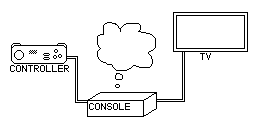Display lag: Difference between revisions
(Undid edit by Ac2k: yes this is technically a mechanic, but it's not a game mechanic as it's the TV's fault (not sure what a better category would be though)) |
No edit summary |
||
| Line 1: | Line 1: | ||
{{ArticleIcons|ssb=y|ssbm=y|ssbb=y}} | {{ArticleIcons|ssb=y|ssbm=y|ssbb=y}} | ||
[[Image:DisplayLag.gif|thumb|256px|An example of 5 frames of display lag at 60 frames per second.]] | |||
{{art-wikipedia}} | {{art-wikipedia}} | ||
'''Display lag''' is the delay between a console producing output and a television displaying said output. In most cases, it is caused by high-resolution TVs imposing additional processing on the visual data it receives in order to make it look better, a feature that, while useful for non-interactive applications such as video players and technical demos, is against the real-time requirement of gaming and results in the illusion that there is an in-game delay between input and action. | '''Display lag''' is the delay between a console producing output and a television displaying said output. In most cases, it is caused by high-resolution TVs imposing additional processing on the visual data it receives in order to make it look better, a feature that, while useful for non-interactive applications such as video players and technical demos, is against the real-time requirement of gaming and results in the illusion that there is an in-game delay between input and action. | ||
Revision as of 11:55, March 23, 2013
Display lag is the delay between a console producing output and a television displaying said output. In most cases, it is caused by high-resolution TVs imposing additional processing on the visual data it receives in order to make it look better, a feature that, while useful for non-interactive applications such as video players and technical demos, is against the real-time requirement of gaming and results in the illusion that there is an in-game delay between input and action.
Display lag is difficult to quantify but easy for skilled players to feel; simply moving a pointer around the screen with a Wii Remote can reveal small amounts of display lag, while the fact that controller feedback such as rumble or the Wii U's GamePad is not delayed by the TV can also make display lag obvious to sensitive players. It can be described as similar to playing online, though at a more constant and predictable rate.
Even for small amounts of display lag, some games with stringent timing requirements (such as rhythm games) may become difficult or infeasible to succeed at. For the Super Smash Bros. series specifically, every frame of display lag essentially decreases the possible reaction time of players, increasing the amount of prediction necessary to win and widening the size of a character's safe movepool. As a result, tournaments heavily favour setups with older TVs that lack display lag should newer TVs not have an option to disable whatever features it may have to improve image quality.

